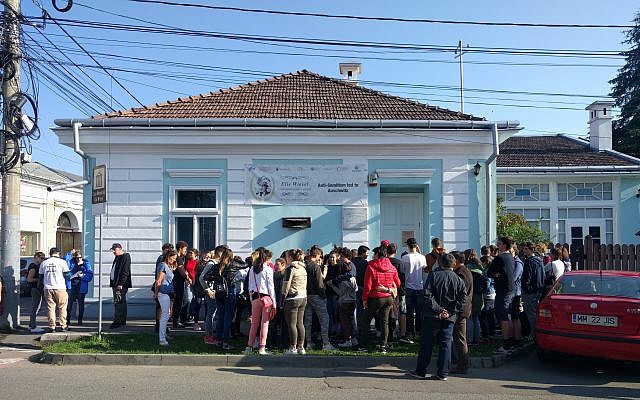The childhood home of late Nobel Prize-winning author and Holocaust survivor Elie Weisel was vandalized with anti-Semitic graffiti overnight Friday, police in the Romanian town of Sighet told local media.
A police spokesperson on Saturday said an investigation into the vandalism had been opened immediately, and police were combing security camera footage from a nearby building in an effort to identify the perpetrators.
Some of the graffiti included slurs against Wiesel, calling him a “Jewish Nazi” who was “in hell with Hitler,” and an “anti-Semitic pedophile.” There was also a reference to Germany’s Angela Merkel, Russia’s Vladimir Putin, and US President Donald Trump.
Wiesel’s pre-World War II home was converted into a Holocaust education center in 2014 in memory of the 13,000 local Jews who were deported to Auschwitz, where most were killed.
In 2014, when it was inaugurated the “Holocaust Cellar,” Weisel said he was “deeply honored” his home would be a place where the local Romanian population could learn about the Holocaust.
“The opening of the Holocaust Cellar supports my life’s efforts to ensure that humanity never forgets the evil that took place there and throughout Europe,” he wrote.
In a press statement cited by the Romanian news site Realitatea.net, the Israeli embassy expressed its “dismay” over the incident, condemning “this unprecedented anti-Semitic act” and expressing its hope that the perpetrators would quickly be brought o justice.
The news site also said the embassy thanked the police and local authorities for promptly removing the graffiti.

A group of Romanian high school students waiting outside Elie Wiesel’s childhood home to take a tour of the now Holocaust museum, Monday, September 11, 2017. (Yaakov Schwartz/Times of Israel)
In 1944, When Wiesel was 15, he and his family, along with the rest of the Jews in the Sighet area, were rounded up and forced into ghettos. Several months later, 131,639 of them were deported to Auschwitz-Birkenau, and most were exterminated.
In total, between 280,000 and 380,000 Romanian and Ukrainian Jews were murdered or died during the Holocaust in territories under Romanian control during World War II.
Wiesel, who was considered “the world’s leading spokesman on the Holocaust,” is remembered for his life’s work in keeping alive the memory of the genocide that killed six million Jews during World War II.

No comments:
Post a Comment